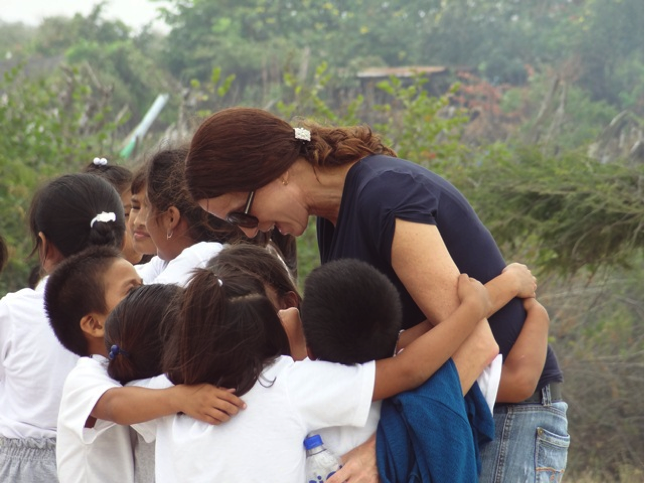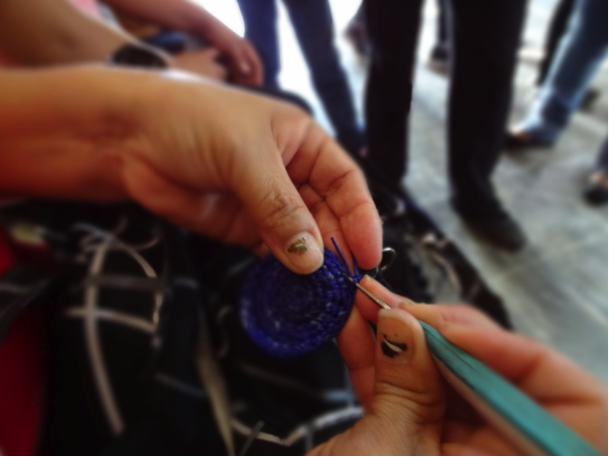Beyond the Clinic: A holistic approach to creating community health in Ecuador
So an MBA walks into a pueblo…
After a decade of working with and studying health care delivery in the United States, I wanted to see some of the best ideas happening elsewhere in the world. So when the International Partnership for Innovative Healthcare Delivery (IPIHD) offered me a chance to work with APROFE in Ecuador, I grabbed my passport and headed south.
APROFE was founded by Dr. Paolo Marangoni in 1965, with one simple office in Guayaquil providing family planning counseling and education on the only acceptable means at the time – natural family planning. Today it’s a non-profit with 800 employees, serving 1.3 million patients annually through 16 clinics across Ecuador. So I knew they were doing something right.
As I toured APROFE’s main facility in Guayaquil, I furiously took notes about its flex-staffing model, efficient in-house path lab and eco-friendly sterilization methods. I learned about its customer service training for doctors, its best practices for procedures (which have been adopted as national standards), and its custom EHR platform used for quality reporting.
But then I discovered that what truly sets APROFE apart from health care delivery elsewhere in the world is what happens outside the clinic.
 Every country in the world struggles with the tension inherent in a system called “health care” that relies on sickness for its financial sustainability. When Larissa Marangoni began working for her father at APROFE, she asked: “How can we build a system that thrives on health, rather than illness?”
Every country in the world struggles with the tension inherent in a system called “health care” that relies on sickness for its financial sustainability. When Larissa Marangoni began working for her father at APROFE, she asked: “How can we build a system that thrives on health, rather than illness?”
(Left: Larissa Marangoni and children from the Puerto del Morro community)
To that end, APROFE’s community outreach program centers on a traveling annual arts residency, and three brigades of staff and equipment that go into towns to make communities – and the people in them – healthy.
The first brigade is their mobile clinic, which packs a huge array of services into small, modified RV. The mobile clinic travels a regular and repeated route, parking in medium-sized towns around Guayaquil for a week at a time to provide dental cleanings, tooth repair, prenatal care, family planning counseling and hygiene education. A committed staff of four people serve the clinic: an OB/GYN, a dentist, a nurse, and a health educator who doubles as a driver.
There are areas, however, too rugged for the clinic to reach – a challenge faced by many remote communities. Enter the second and third brigades, brought in by pickup truck to small rural towns on a rotating weekly schedule. The medical brigade, with a doctor, nurse and psychologist, reinforces the lessons planted by the community brigade: craft/sewing instructors, a soccer coach, a dance teacher and a health educator/coordinator.
This is where the real magic happens.
APROFE’s leaders figure that if a community is culturally, socially and economically depressed, the people there will never achieve physical health. By bringing together art, physical education, mental health workshops and individual counseling, along with skills courses and economic development resources to stimulate entrepreneurship, the ecosystem begins to flourish and health is a happy byproduct of a thriving community.
As an MBA student, I learned about economic development zones in places like India and the Research Triangle Park in North Carolina, where policymakers stimulate new areas of business technology with a supporting cast of large and small companies. These ideas bear a striking resemblance to APROFE’s approach to creating “health development zones.”
The concept starts with the mobile clinic, which as I mentioned, has geographic constraints. When neighboring pueblos reach out to the staff in the mobile clinic, APROFE gets a sense of nearby areas that appear resource poor, but have the right energy and potential to thrive given the right skills.
The second step involves mixing in local leadership to engage the community. APROFE enlists town governments to host a two-week artist residency, bringing contemporary artists to live and work in the town. Artists are selected for their skill at catalyzing people to work together on a common creation. Through pieces such as communal songwriting and photos that map out town history, APROFE inspires people to realize their collective energy and the potential for collaborating with each other.

The third step brings in activities that strengthen economic, social and health development. After the artist residency, members of the community brigade (who often start visiting the town during the residency preparations) work with leaders to start physical education programming for kids, such as soccer and dance. They incorporate games that teach healthy behavior, like developing good study habits or resisting drugs and alcohol.
(Right: participants in an APROFE skills development program)
Teachers offer courses to the women on skills that lead to revenue-generating microbusinesses, such as sewing, jewelry making and baking. And of course, the family planning on which APROFE was built remains central to community education. From these residencies, businesses emerge and are nurtured by micro-loan programs for supplies and materials. The resulting products are sold in the local and neighboring communities, bringing the benefits full-circle.
I met with people in the four towns where APROFE has delivered this model. I heard story after story of children who were transformed though the program and went on to become track stars, youth leaders or college students – roles previously unimaginable. I also discovered small women-owned businesses, creating crafts for sale – but perhaps even more importantly, creating laughter and social structures where previously the women had been isolated. I saw groups of women who’d rarely ventured outside their homes now happy, smiling and participating in dance classes with other women, now friends and colleagues in work.
But as transformative as these outreach programs can be, there are questions about their sustainability. Though APROFE’s clinics are self-sustaining, the funding for community programs is limited and unpredictable. My current role in Ecuador involves helping APROFE strengthen the sustainability of these programs.
But it seems to me that the world’s typical approach to health care – existing only to heal the sick – is what is truly unsustainable. Until we find ways to foster more APROFEs, to build community health through social stability, education, creativity and economic development, we are doomed to keep building centers focused on disease. APROFE doesn’t view the people they serve as patients. They are clients and communities. In fact, during my visit, I never once heard the word patient – not even in talking to doctors. Funny, huh?
As health leaders in the US and other developed countries begin to focus on holistic patient care and multidisciplinary approaches to building healthier communities, a closer look at APROFE could yield great benefits. What if we built more workforce proficiencies around creating smiles, jobs and communities that lead to better health outcomes? Perhaps not surprisingly, I didn’t learn that in business school, but in the pueblos of Ecuador.
Learn more about APROFE’s model in their IPIHD profile, or watch the video below to learn about their most recent project:
Monica VanBuskirk is a Summer Associate at IPIHD and a recent graduate from Duke University’s Fuqua School of Business.
- Categories
- Education, Health Care
